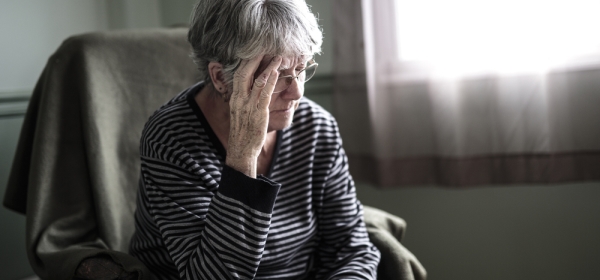Australia has a problem when it comes to giving older Australians access to mental health services. Leading peak national organisation COTA says existing policy is designed to lock out older Australians living in residential aged care from accessing essential services. The organisation has launched a petition to tackle the problem.
Yesterday, COTA Australia CEO Ian Yates released figures stating that 175,000 older Australians living in aged care homes are ineligible to access Medicare-funded mental health treatment through a specially-designed program, which aims to streamline community access to mental health services.
The Better Access to Mental Health Care program, introduced in 2006 by the Liberal Government, can be accessed by those living in their own homes and receiving a high-level Home Care Package, but excludes aged-care residents. The supposed logic is that those living in residential care can access mental health treatment plans and associated psychological therapies through their aged care provider. However, Mr Yates says, due to lack of funding, this simply isn’t happening enough.
While launching the public petition yesterday, Mr Yates suggested that the situation was reminiscent of a time before basic citizenship rights, when older people were removed from the community and ‘put away’ in nursing homes.
“This policy still treats them as though they are institutionalised and without any control over their own lives,” said Mr Yates.
According to Beyond Blue, between 10 and 15 per cent of older Australians experience depression and about 10 per cent experience anxiety. Rates in depression among people living in residential aged care are exponentially higher, at 35 per cent. Yet, research by Sydney and Deakin universities has repeatedly shown that less than two per cent receive the treatment clinically recommended to them.
“Given the high incidence of depression and other mental health conditions suffered by resident of aged care facilities, there is clearly a problem here that needs to be urgently addressed,” he said.
COTA’s petition is an appeal to the Minister for Health, Greg Hunt, to revise the program’s policy to include those living in aged care, giving them access to the Medicare-funded psychological treatment.
“The new Minister for Health needs to make this an urgent and early priority. We are calling on him to take it to Cabinet, where the Government must agree to reverse this historical anomaly so that nursing home residents have the same access to mental health services as everyone else.
“Our frailest older Australians deserve the best care we can offer,” said Mr Yates.
Read more at cota.org.au
Sign the petition at healthforolderaustralians.org.au
Opinion: Elderly are suffering in silence
A recent investigation by Fairfax Media earlier this month revealed the systematic, widespread suffering of aged-care residents, whose mental health needs are being neglected. Legal and health experts say that this is directly caused by the “ridiculous” Medicare rule that locks aged-cared residents out of mental health services.
The Government might try to claim that depressed residents’ needs are taken care of through the aged care system, but the reality is that these homes almost never pay for clinical mental health treatments. The Fairfax Media investigation found that this is because the Government hasn’t actually given them adequate funding or legal influence to do so.
Ronda Gordon, 87, is a nursing home resident from Adelaide who suffers from a non-progressive motor neurone disease and who isn’t allowed to have Medicare-funded psychology treatments because of the exclusion policy. She highlighted the very real challenge of tackling both her own deteriorating health, while living alongside those suffering from dementia, while being of sound mind herself.
“It’s very difficult living in an area where you have your mental state and a deterioration in your body… and you have your full faculties, and living amongst people that are mentally not sound. It’s very hard, from day-to-day.
“Most workers who work in this area find it gratifying but they can walk off and go home into the community. They don’t spend 24-hours a day amongst it, day in, day out,” said Ms Gordon.
Whether the answer is to revise the Better Access to Mental Health Care program to give aged-care residents access to services, or to better equip aged care facilities to support the mental health treatment of their residents, something must be done. No one deserves to suffer in silence; being denied help that could improve their quality of life – especially not a group of people who are already flagged as having high rates of depression and anxiety.
Surely, providing adequate mental health support is the least we can do for the oldest members of our community.
What do you think? Have you ever tried to access Medicare-funded mental health support? If you live in residential care, how have you found your emotional and psychological needs were being met?
If you or someone you know has depression, or if you have symptoms that significantly affect your life, work or relationships day-to-day, then it’s important to see your doctor as soon as possible. You can also call Beyond Blue on 1300 22 4636.
To read more about depression and grief, visit Beyond Blue and the NHSD.
Related articles:
How to recognise depression
Mental health system in disarray
Handy mental health resources

